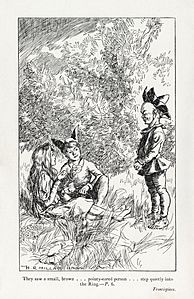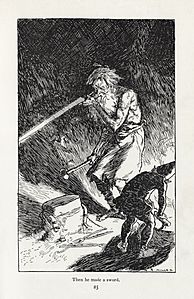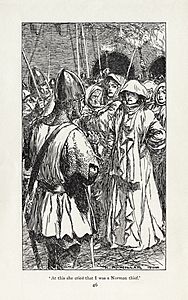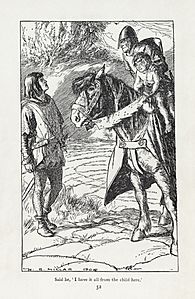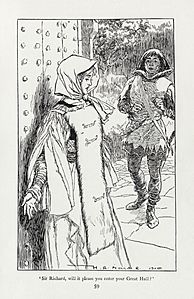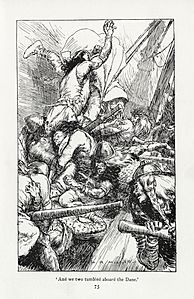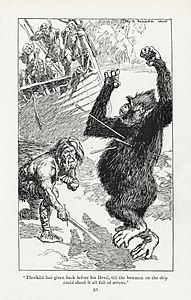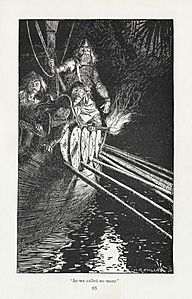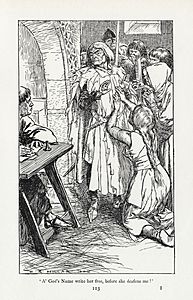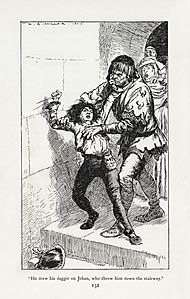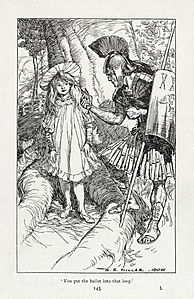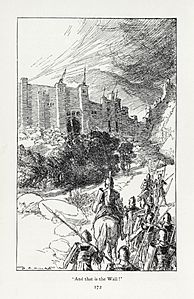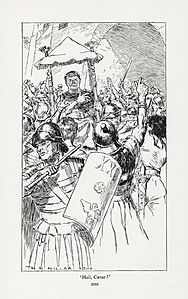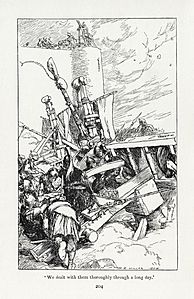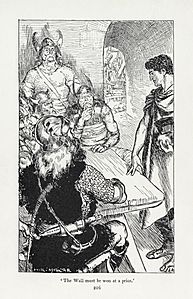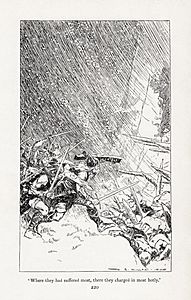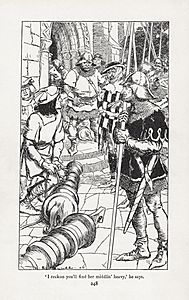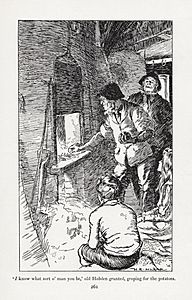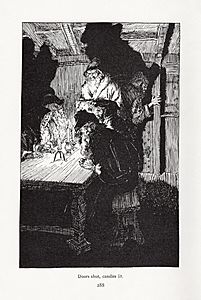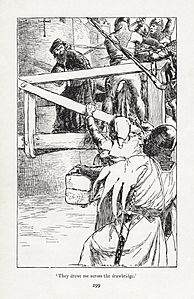Puck of Pook's Hill facts for kids
Puck of Pook's Hill is a fantasy book written by Rudyard Kipling, first published in 1906. It tells a series of short stories that take place in different times in English history. The book is both a historical fantasy because some stories from the past include magic, and a contemporary fantasy because it shows a magical being, Puck, using his magic in England around 1900, when the book was written.
The stories are told to two children who live near Burwash, in the High Weald area of Sussex, close to Kipling's own home, Bateman's. The storytellers are people magically brought from history by the elf Puck, or Puck himself tells the tales. Puck, who calls himself "the oldest Old Thing in England," is also a famous character in William Shakespeare's play A Midsummer Night's Dream.
The stories vary from realistic historical tales, like "A Centurion of the Thirtieth," to children's fantasy, like "Dymchurch Flit." Each story begins and ends with a poem that connects to the story's main idea. Puck calmly finishes the series of stories by saying: "Weland gave the Sword, The Sword gave the Treasure, and the Treasure gave the Law. It's as natural as an oak growing."
The stories first appeared in the Strand Magazine in 1906. The first book version had illustrations by H. R. Millar. Arthur Rackham added four color pictures for the first US edition. Four years later, a second book called Rewards and Fairies was published, featuring the same children in the next summer.
Contents
- Stories and Poems in the Book
- Puck's Song: An Introduction
- Weland's Sword: An Ancient Tale
- A Tree Song: Oak, Ash, and Thorn
- Young Men at the Manor: After the Conquest
- Sir Richard's Song: A Norman in England
- Harp Song of the Dane Women: A Viking Lament
- The Knights of the Joyous Venture: A Daring Voyage
- Thorkild's Song: A Sailor's Wish
- Old Men at Pevensey: A Royal Intrigue
- The Runes on Weland's Sword: Summarizing the Past
- A Centurion of the Thirtieth: Empires Rise and Fall
- A Centurion of the Thirtieth: A Roman Soldier's Story
- A British-Roman Song: Loyalty to Rome
- On the Great Wall: Defending the Border
- A Song to Mithras: A God's Hymn
- The Winged Hats: More Wall Defenses
- A Pict Song: The Spirit of the Picts
- Hal o' the Draft: Unsung Heroes
- Hal o' the Draft: A Tale of Deception
- A Smuggler's Song: Look the Other Way
- The Bee Boy's Song: Telling the Bees
- Dymchurch Flit: A Fairy Tale
- A Three Part Song: Sussex Landscapes
- The Fifth River: The River of Gold
- The Treasure and the Law: Leading to Magna Carta
- The Children's Song: A Prayer for the Land
- Original Book Illustrations
- See also
Stories and Poems in the Book
This section lists the stories and poems found in Puck of Pook's Hill. Each story is paired with a poem that relates to its theme.
Puck's Song: An Introduction
This poem sets the stage and introduces some of the ideas you'll find in the stories that follow.
Weland's Sword: An Ancient Tale
This story is told by Puck himself. It takes place in Burwash in the 11th century, just before the Norman Conquest.
A Tree Song: Oak, Ash, and Thorn
This poem is about English trees. It especially highlights the special meaning of the Oak, Ash, and Thorn trees.
Young Men at the Manor: After the Conquest
This story continues from the previous one, set right after the Norman Conquest. It's told by Sir Richard Dalyngridge, a Norman knight who helped in the Conquest and was given a Saxon manor.
Sir Richard's Song: A Norman in England
This poem is about Sir Richard Dalyngridge. It describes how he got used to living in England, even though he was from Normandy.
Harp Song of the Dane Women: A Viking Lament
This is a sad song sung by Danish women. They are sad because their men leave to go on viking voyages across the grey sea.
The Knights of the Joyous Venture: A Daring Voyage
This story tells about a brave journey to Africa made by Danes. They captured Sir Richard and his Saxon friend Hugh at sea and took them along.
Thorkild's Song: A Sailor's Wish
This is a song sung by a Danish sailor, hoping for good wind to help his ship sail.
Old Men at Pevensey: A Royal Intrigue
This story continues the earlier tales. It's about a secret plot in Pevensey at the start of the reign of Henry I in 1100 AD.
The Runes on Weland's Sword: Summarizing the Past
This poem sums up the stories that have been told in the book so far.
A Centurion of the Thirtieth: Empires Rise and Fall
This poem talks about how cities, thrones, and powerful empires are temporary, like flowers that bloom for only a week.
A Centurion of the Thirtieth: A Roman Soldier's Story
This story introduces a new narrator, a Roman soldier named Parnesius. He was born and served in Britain in the 4th century. He explains how his military career started well because the general Magnus Maximus knew his father.
A British-Roman Song: Loyalty to Rome
This is the song of a Roman Briton. He serves Rome even though he and his family have never seen the city itself.
On the Great Wall: Defending the Border
This story is about how Hadrian's Wall was defended against the native Picts and Scandinavian raiders.
A Song to Mithras: A God's Hymn
This is a song praising the god Mithras.
The Winged Hats: More Wall Defenses
This story returns to Hadrian's Wall and tells what happened to Magnus Maximus.
A Pict Song: The Spirit of the Picts
This is a song from the Picts. It explains that even though they were often defeated by the Romans, they believed they would win in the end.
Hal o' the Draft: Unsung Heroes
This poem is about how prophets or special people are often not recognized or celebrated in their own hometowns.
Hal o' the Draft: A Tale of Deception
This story is about a trick involving the explorer Sebastian Cabot and the privateer Andrew Barton. It probably takes place near the end of the 15th century and is told by Sir Harry 'Hal' Dawe.
A Smuggler's Song: Look the Other Way
This song is sung by a smuggler. It advises people to pretend not to see when illegal goods are brought through town.
The Bee Boy's Song: Telling the Bees
This poem explains that honey bees must be told all the news, or they will stop making honey.
Dymchurch Flit: A Fairy Tale
This is a fairy tale told by Puck (who is in disguise). It is set around the time when monasteries were closed down (about 1540 AD).
A Three Part Song: Sussex Landscapes
This poem describes the three main types of landscapes in Sussex: the Weald, Romney Marsh, and the South Downs.
The Fifth River: The River of Gold
This story tells how God gave four great rivers of the Garden of Eden to humans. But later, Israel was given a secret fifth great river, the River of Gold.
The Treasure and the Law: Leading to Magna Carta
This story is told by a Jewish moneylender named Kadmiel. It's about money and secrets that led to the signing of Magna Carta in 1215. Here, we learn what happened to most of the African gold that Sir Richard Dalyngridge brought back to Pevensey.
The Children's Song: A Prayer for the Land
This is a patriotic prayer to God. It asks God to teach children how to live well so that their land will be successful.
Original Book Illustrations
See also
 In Spanish: Puck de la colina de Pook para niños
In Spanish: Puck de la colina de Pook para niños
 | Charles R. Drew |
 | Benjamin Banneker |
 | Jane C. Wright |
 | Roger Arliner Young |


